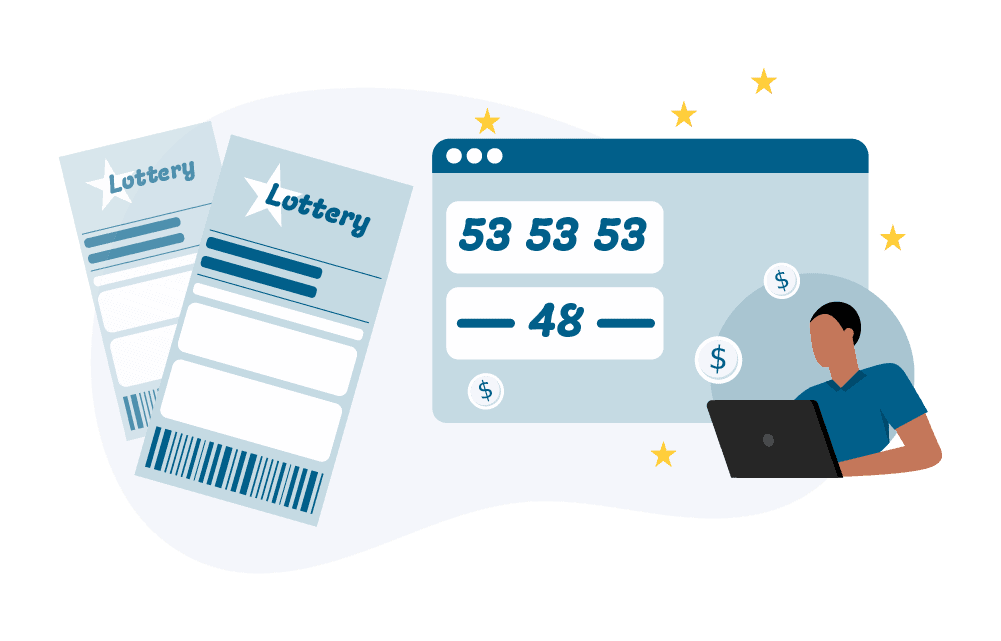This post is also available in:
Traditional yet still dear to many, Brazilian lotteries are deeply woven into the culture of the nation. Our study identifies and describes the most popular lotteries in Brazil, providing a complete guide to recent regulatory changes and various initiatives to restructure and improve the draw-based gaming market.
We also add classic real-money verticals like bingo and scratch cards to the picture, in order to compare and present a broader framework of instant win games in Brazil.
Main Takeaways
- Mega-Sena is the most popular Brazilian lottery
- Powerball is the most popular foreign lottery in Brazil
- The Federal Lottery is the lottery with the highest odds of winning
- Currently, there are 13.295 agencies of the Federal Lottery network
- There are also 6 state and 4 city lotteries actively operational
- Land-based casinos may soon return in a number of states if legislators follow through with proposed bills
- Other classic real-money games like scratch cards and bingo are also on the verge of making a legalized, promising comeback across Brazil
- Online lotteries and instant games are gaining popularity
Methodology
- To support this study, we carried out a literature review on the legislation and the history of Brazilian lotteries, scratch cards and bingo halls.
- Our analysis expands on earlier ENV Media research insights about Brazilian gambling demographics and preferences
- We validate study findings via metrics from professional SEO tools – e.g., average monthly search volumes for lottery games, keyword analysis and website rankings among others.
Lottery Is Among the Most Trusted Gambling Verticals in Brazil
According to an ENV Media research on the perception of fairness among Brazilian players, 49% consider the Lottery the fairest form of betting, followed by sports betting at 33%.
Original surveys from 2024 shows that 72% of Brazilians bet on the Lottery and 42% on sports betting, making them the most popular gaming verticals. The Lottery is seen as “traditional” and is widely accepted due to its long history and government backing, which helps it be perceived as the most trustworthy real-money game on the market.
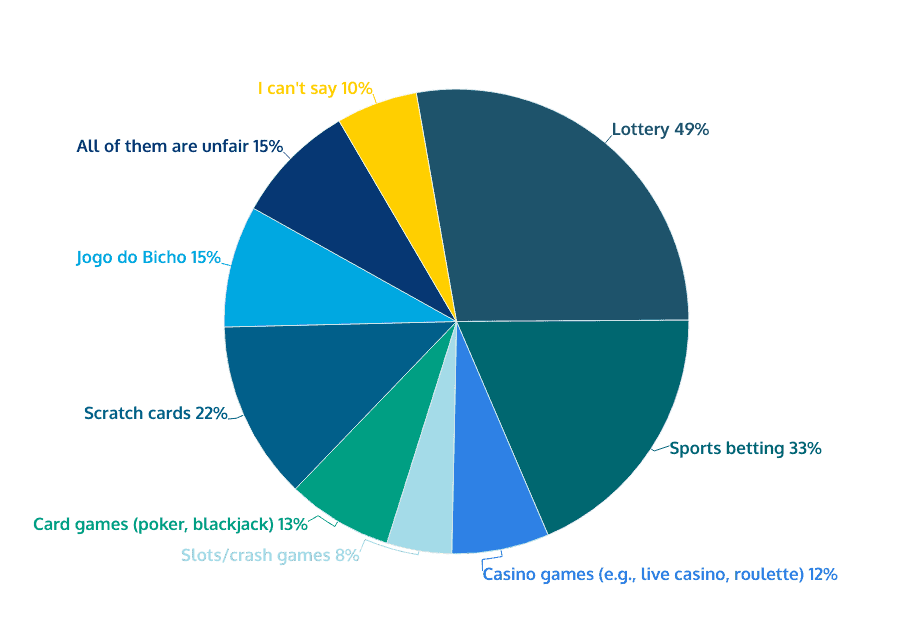
Lottery Market Volume, Prize Pool, Ticket Prices and Estimated Sales
In the first half of 2024, Caixa reported a recurring net income of R$ 6.2 billion, a growth of 36.6% over the previous year. Likewise, the profit for Q2 2024 was R$ 3.3 billion, up 27.3% from Q2 2023.
In terms of total turnover, in the first half of 2023 Caixa collected R$ 10.34 billion. For the corresponding timeframe of 2024, it recorded total sales of R$ 12.3 billion – of which R$ 4.8 billion went to social causes (18,3% more than in the previous year). On the other hand, Caixa Lotteries posted a record turnover of R$ 23.4 billion in 2023, the highest result in its history so far.
Lottery winners received R$ 4 billion in total prizes for the first half of 2024.
At an average price of R$ 3,25, Caixa has sold 3.78 billion lottery tickets in Q1 and Q2 of 2024 combined, 19% more than the same period in 2023. While a stronger Q3-Q4 were the key to all-time high sales a year earlier, we fully expect turnover and ticket sales to reach new heights in 2024– estimating around 8 billion tickets sold for the year.
Who Plays the Lottery in Brazil?
A study published in August 2024 surveyed 2,897 Brazilian gamblers. Among those actively playing the lottery (46% of respondents), we see some clear trends and behavioral patterns:
- 90% have been playing the lottery for more than a year
- 74% spend less than R $50 per month in lottery games
- 46% spend between R$ 10 and R$ 50 per month
- 49% spends less than R$ 10 on a single lottery draw
- 82% chooses lottery games with higher prizes
- 53% make collective lottery bets
- 1% spend over R$ 100,00
Additionally, an analysis of the latest Household Budget Survey conducted by the Brazilian Institute of Geography and Statistics (IBGE), showed that, between 2017 and 2018:
- On average, the typical Brazilian lottery player is male, Caucasian, aged 50-64, lives in urban areas of the Southeast, works in the private sector and earns up to two minimum wages
- Nearly 6 million Brazilians – or 4% of adults – played lotteries
- Among them, 4 million played Mega-Sena
- Players spend an average of R$ 65,00 per month, mostly on Mega-Sena and the Federal Lottery
Based on these numbers (and other market statistics from the IBGE study), it is possible to estimate that the average ticket cost in 2017-2018 was R$ 1,92 and, thus, each player bought approximately 33.8 tickets a year; 2.82 per month; and 0.65 per week.
Put simply, the typical lottery fan usually buys one ticket per week, with the exception of particular periods in their annual cycle (e.g., on vacation, too busy or otherwise impeded).
Online Lotteries
Currently, the Caixa Econômica Federal´s platform and mobile app give access to the full range of lottery draws that also offer a paper ticket version across the nation. Besides those, there are only a few legitimate operators of online lottery games in Brazil, for instance Sorte Online. This is mostly owed to the statute of state or municipal online lotteries, making them accessible exclusively to local residents.
Nevertheless, market forecasts predict that online lotteries in Brazil may reach R$ 4.476.785 million in sales by the end of 2024, while user penetration rates are expected to reach 0.4 percent of the total adult population.
Most Popular Lotteries in Brazil
The table below ranks lotteries based on 2024 Google search volume data for branded queries from Brazilian IPs. It clearly shows which lottery games players are most interested in.
| Lottery | Average monthly search volume |
|---|---|
| Mega-Sena | 14.900.000 |
| Lotofácil | 10.900.000 |
| Quina | 6.160.000 |
| Lotomania | 1.030.000 |
| +Millionária | 782.000 |
| Dupla Sena | 765.000 |
| Federal Lottery | 476.000 |
| Dia de Sorte | 453.000 |
| Timemania | 214.000 |
| Super Sete | 130.000 |
| Loteca | 61.100 |
| Powerball | 45.400 |
| Mega Millions | 1.300 |
According to search volumes reported by Mangools for each branded term, the most popular lottery games in Brazil are Mega-Sena, Lotofácil and Quina. These are also the three draws which brought the highest total revenues for Caixa in 2023 (aggregate results for online lottery and paper ticket sales).
Notably, out of the 13 lottery draws on the list, only Powerball and Mega Millions are foreign-based and not run by Caixa. On the other hand, despite the fact that these North American competitors have registered the least interest among Brazilian players (judging by Google search volumes), we can also see a slow but steady upward trend in demand for Powerball – monthly interest almost doubled in the past 5 years.
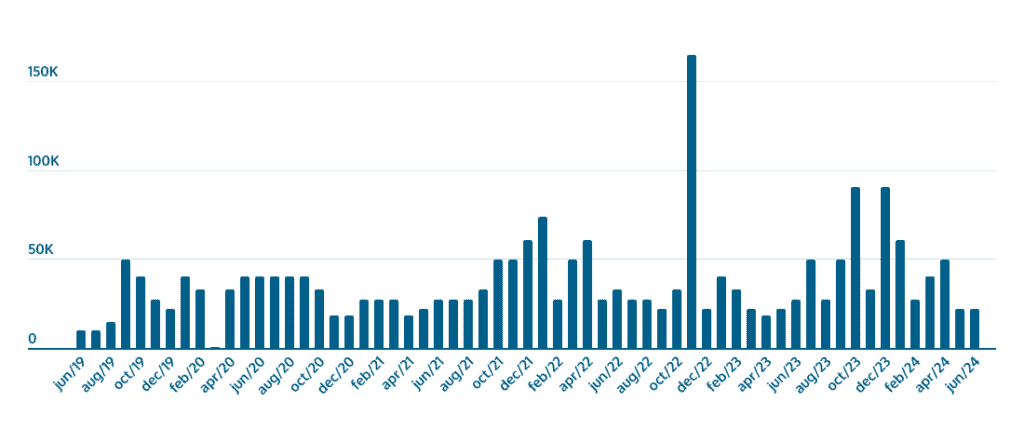
Lotteries with the Best Chance of Winning
Calculating the probability of winning the lottery is straightforward. We will provide an example with Mega-Sena, the most popular online lottery in Brazil.
With a single ticket (or online lottery entry), players can pick up to 6 of the 60 numbers available (from 1 to 60). To find out how many possible combinations of 6 numbers there are in the total set of 60, we need to apply the combination formula – C(n, k) = n! / [k! * (n – k)!] – where “n” equals the total of 60 numbers and “k” the 6 numbers chosen by the player. Thus, the number of possible Mega-Sena combinations is 50,063,860.
In other words, the chances of winning the lottery in Brazil (Mega-Sena in particular) are less than 1 in 50 million, if we define “winning the lottery” as guessing correctly all 6 numbers drawn.
In the table below, the top lottery games are ranked according to the highest odds of winning, in descending order. The Brazilian Federal Lottery is the game that offers the best chance for players to win, while Megamillions is the game least likely to pay out the jackpot.
| Game | Range of numbers available to bet on | Amount of correct numbers needed to win | Probability of winning (1 in X) |
|---|---|---|---|
| Federal Lottery | 1 to 5 | a 5-digit number from 00000 to 99999 | 100.000 |
| Loteca | 15 to 25 | 11 to 15 | 2.391.485 |
| Dia de Sorte | 7 to 15 | 3 to 7 | 2.629.575 |
| Lotofácil | 15 to 20 | 11 to 15 | 3.268.760 |
| Super Sete | 0 to 9 | 8 | 10.000.000 |
| Lotomania | 50 | 15 to 20 and 00 | 11.372.635 |
| Dupla Sena | 6 to 15 | 3 to 6 | 15.890.700 |
| Quina | 5 to 15 | 2 a 5 | 24.040.016 |
| Timemania | 7 + Heart Team | 3 to 7 + Heart Team | 26.472.637 |
| Mega-Sena | 6 to 20 | 4 to 6 | 50.063.860 |
| +Milionária | 6 to 12 and 2 to 6 clovers | 2 + 1 clover | 238.360.500 |
| Powerball | 1 to 69 and 1 to 26 powerball | 5 + 1 powerball | 292.201.338 |
| Megamillions | 1 to 70 and 1 to 25 Mega Ball | 5 + 1 Mega Ball | 302.575.350 |
Lotteries with the Best Odds of Winning in Relation to Ticket Price
The ratio between ticket cost and jackpot odds is crucial for lottery players. It is calculated by dividing the ticket price by the probability of winning.
Known for its favorable odds, Loteria Federal serves as an example. A Loteria Federal ticket costs R$ 4, with a 1 in 100,000 chance of winning the jackpot. It offers a better advantage for players by ensuring winners in every draw, unlike Mega-Sena or +Milionária.
Therefore, considering the differences in probabilities, the table below shows the Brazilian lotteries offering the best chance to win in proportion to ticket price. In addition, we have listed some of the features that make them more attractive to regular online lottery players in Brazil.
| Lottery | Advantages |
|---|---|
| Loteria Federal | With the best odds among Brazilian lotteries, it also ensures winners in every draw. |
| Loteca | With one of the highest probabilities of winning (1 in 2,391,485), Loteca holds six draws weekly. While ticket also costs less than Loteria Federal, however, its prizes are usually smaller. |
| Dia de Sorte | Priced at R$ 2.50, Dia de Sorte has similar odds to Loteca but offers three weekly draws and substantial main prizes. |
| Lotofácil | Starting at R$ 1.5 million, Lotofácil jackpots can grow significantly. It offers frequent payouts and a high percentage of winners, though the jackpots are smaller compared to Mega-Sena. |
Alternatively, the RTP (Return to Player) metric determines the best lottery in terms of payouts. It is calculated by dividing the total prize value by the total ticket sales. For example, if a lottery sells R$ 1.000.000 in total tickets sold and has a total prize value of R$ 500.000, the RTP would be calculated as follows:
RTP = Total Prize Value / Total Ticket Sales × 100
RTP= (R$ 500,000 / R$1,000,000) × 100
RTP = 0.5× 100
RTP = 50%
That is, 50% of ticket sales are returned to players in the form of prizes.
Interestingly, despite the fact that the lottery RTP is a lot lower than many other gambling verticals like roulette or slots, online lotteries and paper-based lotto draws still enjoy the trust of consumers and are often among habitual gaming spending.
Based on the above-listed game parameters (i.e., probabilities and payouts) Mega-Sena offers larger and more frequent payouts, while +Milionária is known for high jackpots. But as more tickets are sold, the RTP is lower and vice versa.
History and Popularity of Lotteries in Brazil
According to Institute of Applied Economic Research (IPEA), lotteries were introduced in Brazil in 1784 by the governor of Minas Gerais, who held a raffle to finance the construction of the city hall and prison (the Inconfidentes Museum today).
By the time the Portuguese royal family arrived in 1808, lotteries were already widespread in Brazil. They benefited Santa Casa’s charity hospitals, as well as other social and cultural institutions.
However, it was not until 1962 that the lotteries were transferred exclusively to the management of the Union, through Caixa Econômica Federal, by Decree 1.146, signed by President João Goulart.
Brazilian States Lotteries
As already mentioned, lotteries remain the most popular vertical in Brazil. Previous studies on player preferences reveal that public lotteries are the most traditional and accepted form of legal gambling in the country, and these levels of public trust propagate the game’s image and perception.
In 2020, however, the Federal Supreme Court (STF) ruled against the Union’s monopoly to operate lotteries because they provide public services, not profit. Therefore, the states – through residual constitutional powers – should have the right to establish, operate and subcontract lottery games.
Regional Lotteries Operating before 2020 in Brazil
Prior to this STF decision, out of the 26 Brazilian States and the Federal District, only 4 states operated their own lotteries:
| State Lottery | Creation Date | Website | Products | Revenue in 2023 |
|---|---|---|---|---|
| Ceará State Lottery – Lotece | Created in 1947 and ratified in 1948. | Lotece | Totolec Show, Online Totolec, Extra Totolec, and Totolec Interior raffle-style lottery; Loteria dos Sonhos and Extração da Moto fixed-odds lotteries. | R$ 431.000,00 |
| Minas Gerais State Lottery – Lemg | Created in 1939, Lemg is the oldest Brazilian lottery. | Lemg | Raspadinha™ instant lottery (Jogo da Velha, Boa Sorte, 7 da Sorte and Super Premiada; Keno, Multiplix, Minas 5 and Totolot prognostic lottery; Speed Race fixed odds lottery game; and Totogol,a simulation of a football match where you bet on the possible results of the game. | R$ 22,080,366.67 |
| Paraíba State Lottery – Lotep | Created in 1955. | Lotep | Sorte Sua passive lottery | R$ 5,927,505.04 |
| Rio de Janeiro State Lottery – Loterj | Created in 1944. | Loterj | Rio de Prêmios passive lottery, Raspa Rio instant lottery, Pixbet, Apostou.com, Todo Mundo Joga, Best Bet and Rio Jogos credentialed online sports betting platforms | R$ 49,307.58* |
Brazilian State Lotteries Licensed since 2020
| State Lottery | Creation Date | Products | Website | Revenue in 2023 |
|---|---|---|---|---|
| Maranhão State Lottery – Lotema | Created in 2024. | Prognostic lottery | Lotema | _ |
| Paraná State Lottery – Lottopar | The first lottery of Paraná – Serlopar – was created in 1996 and extinguished in 2007. Lottopar was founded 14 years later, in 2021. | Prognostic and passive lottery, Raspinha instant lottery | Lottopar | R$ 25.102.597,98 |
Online Lotteries and State Draws Under Development
| State Lottery | Creation/Reactivation/Extinction | Current Status |
|---|---|---|
| Acre State Lottery – Lotac | Created in 2021 by Bill 51/21. | In June 2024, through the State Treasury (Sefaz), the Acre State Government established a Working Group (WG) to prepare a project to regulate and implement the Acre State Lottery. |
| Amazonas State Lottery – Loteam | The first lottery of Amazonas was created in 1965 and extinguished in 1972. Later, the Amazonas State Lottery was created in 2003, but only officially restructured after the approval of Law 5.749/2021. It authorized the creation of a state lottery system. | In 2024, the government of Amazonas initiated a technical study for the operation of the lottery, to be completed in 2025. |
| Central Brazil Consortium (BrC) | In 2021, the BrC launched a call for proposals to create a lottery service which initially includes the states of Goiás, Maranhão, Mato Grosso, Mato Grosso do Sul and Tocantins, is to implement state lotteries and games in the central region of Brazil. | The BrC conducted an Expression of Interest (PMI) process in which four companies will present studies for the implementation of a single lottery for its members. The feasibility studies are in progress. |
| Espírito Santo State Lottery – Loteres | Created in 1963 and sanctioned in 1964, the Espírito Santo State Lottery issued no tickets until 1991, when it launched its first instant lottery, “Raspe a Sorte.” Operations ceased in 1995 but were reactivated in 1998 and 2000, with a name change to Loteres, resuming activities in 2001. | Under Bill 70/2023, it will be operated by Banestes, the state public bank, and regulated by the Public Services Regulatory Agency (ARSP). It will operate both physically and online. The President of the lottery was appointed in September, 2024. |
| Federal District State Lottery | Created in 2022 by Bill 2.312/21. | Approved by the Legislative Chamber of the Federal District, Bill No. 1.081/2024 is to be approved by the state government and authorize the creation of Brasília Bank Lotteries, a subsidiary that will allow the operation of lottery games in the Federal District. |
| Mato Grosso State Lottery – Lemat | Lemat was created in 1953, remained active until 1987, and was reactivated by Decree 273, of April 20, 2011, which was repealed in 2015. | Included in the BrC lottery measure. |
| Mato Grosso do Sul State Lottery – Lotesul | Lotesul was recreated in 2021 by Bill 211/2021. However, NGT Brasil issued an injunction to cancel the public notice, citing difficulties in the accreditation procedure. | In 2024, the Mato Grosso do Sul State Court of Justice (TJ-MS) annulled the notice and the Supreme Court of Justice (STJ) upheld this decision. It is included in the BrC lottery measure, though. |
| Rio Grande do Norte State Lottery – Potiguar Lottery | Loteria Potiguar was created in 1972 but remained inactive. | In 2023, the State Treasury Department began developing a project which needs the governor’s approval to be sent to the Legislative Assembly. |
| Rio Grande do Sul State Lottery – Lotergs | Founded in 1843, Lotergs was suspended in 2004 and formally reinstated in October 2021, by Decree 56.163. | In 2024, six authorized companies submitted studies for the implementation and operation of lottery services in the State of Rio Grande do Sul. The process is undergoing internal evaluation. |
| São Paulo State Lottery | A tender for the concession of the State’s public lottery services for a period of 15 years was authorized by Decree 68.596 of June 10, 2024. | An auction to be held in October 2024 will select the company that will operate the system. |
| Santa Catarina State Lottery – Lotesc | Lotesc was created by State Law 3,812 of March 3, 1966, and ratified by Federal Decree 62,956 of July 8, 1968. Lotesc was extinguished by Law 11.348 of January 17, 2000. However, January 6, 2022 Law 18.334 established the State Fund for Social Promotion and Poverty Reduction to finance social inclusion programs, thus authorizing the establishment of Lotesc. | The regulation for Lotesc is underway and is expected to be completed by the end of 2024. It includes the lottery itself and an online casino. |
| Sergipe State Lottery – Lotese | Law 9440 of April 12, 2024, authorized the state to fund cultural, environmental, social inclusion and assistance activities, as well as the reduction of socio-economic vulnerability through Lotese. It also added provisions to Law No. 8,902 of October 6, 2021, detailing the regulation, control and supervision of Lotese, assigning these functions to the Public Services Regulatory Agency of the State of Sergipe (Agrese). In May, 2024, Bill 143/2024 included sports activities as well. | In September 2, 2024, the public bank of the state of Sergipe – Banese – selected a consortium of Culloden Participações and TSA Informática to enter the negotiation phase for jointly operating the lottery business in Sergipe. |
| Tocantins State Lottery | The project for the Tocantins State Lottery was approved by the legislators in 2022 and sanctioned in January 2023. | In May 10, 2024, Tocantins granted the concession of public lottery services in the state, including the implementation and operation of lottery modalities in virtual, physical-electronic or physical-non-electronic form, to the Lototins Consortium for R$ 15.371.424,02. |
Inactive States Lotteries in Brazil
| State | Current Status |
|---|---|
| Alagoas State Lottery – Loteal | Loteal was created by Law 6.225 of January 15, 2001 and extinguished in 2013 by Law 7.507. |
| Amapá State Lottery – Loteap | Both Request No. 2248/23-AL and Indication No. 2631/23-AL, which create the Amapá Lottery, have been pending since August 2023. |
| Bahia State Lottery – Loteba | Created in 1913 through Decree Law no. 12.727/1913. Later, in 1963, in compliance with Federal Decree Law No. 6.259 of 1944, it was reorganized, through State Law No. 1.951/63. However, following changes in the structure of the Bahia State Public Administration, Law 5.121/89 extinguished the state lottery. |
| Goiás State Lottery – Leg | Created by Law 566 of November 13, 1951 , then extinguished by the Goiás State Attorney in 1998. In 2020, it was proposed Bill 4801/20, which regulates the operation of lottery activities in Goiás. BrC includes Goiás in its lottery measure. |
| Pará State Lottery – Loterpa | Created by Decree-Law No. 5.148 of August 28, 1946, and restructured by Law No 6.570, of August 6, 2003. In 2007 it was suspended by the Federal Public Ministry (MPF) and resumed operations. However, Loterpa was extinguished in 2014. |
| Pernambuco State Lottery – Lotepe | Created by Decree 24977 of May 5, 1948. In 2003, Law 12.343 disciplined the lottery’s activities, regulated later by Decree 31.802 . In 2021, the Government of Pernambuco issued a Public Call Notice, seeking studies to develop a concession model for state lotteries and games. The studies are still in progress. |
| Piauí State Lottery – Piauí Lotteries | On April 25, 2017, the Ministry of Finance terminated the operation of the lottery games of Piauí Loterias (LotoShow). In 2023, Investe Piauí met with representatives of Lemg and Lottopar to study the feasibility of a new lottery. Investe Piauí is a mixed capital company created by State Law 7,495/2021, dedicated to the promotion of regional economic development. |
| Rondônia state lottery – Lotoro | Lotoro was authorized by Ordinary Law 121 of July 21, 1986, then established by Law 315 of July 3rd, 1991. Later, Law 629 of October 24, 1995 authorized the state to grant a concession for the operation of Lotoro. In 2007 its administration was transferred to the state and, finally, it was extinguished in 2019. So far, Rondônia is not included in the BrC lottery measure. |
| Roraima State Lottery – Loterr | Established by Ordinary Law 1.636, of January 18, 2022. |
Municipal Lotteries among the Latest Online Lotteries in Brazil
Although the Brazilian Ministry of Finance understands that municipalities have no authorization to operate lotteries, the STF ruled that they share the same competences as the states in the absence of a clear prohibition in the Federal Constitution. Thus, it will ultimately be up to the STF to decide whether city lotteries are legal on the basis of the 2020 ruling.
Due to the STF decision – and in spite of the current legal insecurity – 14 cities so far have created and are running their own lotteries: Porto Alegre (RS), Pelotas (RS), Caxias do Sul (RS), Cuiabá (MT), Goiânia (GO), Anápolis (GO), Belo Horizonte (MG), Campinas (SP), Embu das Artes (SP), Guarulhos (SP), São Vicente (SP), Taubaté (SP), Poá (SP), Curitiba (PR) and Foz do Iguaçu (PR).
Among those, only Cuiabá, Embu das Artes and Poá actively operate online lotteries, while São Vicente´s Baixada Lottery is administered only in a physical agency so far.
Health and Tourism Lotteries Yet to Come
In March, 2024, the Supreme Court also validated the law that authorizes the government to create lotteries to benefit the National Health Fund (FNS) and the Brazilian Agency for the International Promotion of Tourism (Embratur). There were no initiatives in this sense to this day.
Scratch Cards as an Instant Lottery Draw
Introduced in 1991 by Rio de Janeiro State Lottery (Loterj) – followed by Caixa Econômica only three years later – scratch cards took Brazil by storm.
But due to the publication of Decree No. 8,897/2016, which repealed Decree No. 99,268/1990, Caixa Econômica´s Instant Lottery was extinguished. However, in 2015, Law 13,155 created Caixa’s Exclusive Instant Lottery (Lotex), a digital scratch card game online, abandoning entirely its paper version in the last trimester of 2024.
So far, although territorially restricted, Brazilian state lotteries offer a number of instant win games – Raspadinhatm (Lemg), Raspinha (Lottopar) and Raspa Rio (Loterj) above all. In turn, the online lottery brand “Sorte On Line” markets the digital-only Raspadinha Trevo da Sorte.
Thus, despite the absence of Caixa Econômica Federal’s scratch cards from the national market for the past eight years, the category occupies an honorable third place among the most popular real money games. With the spread of online scratch cards, we expect that share to slowly rise or at least maintain a top spot among trusted online lottery draws.
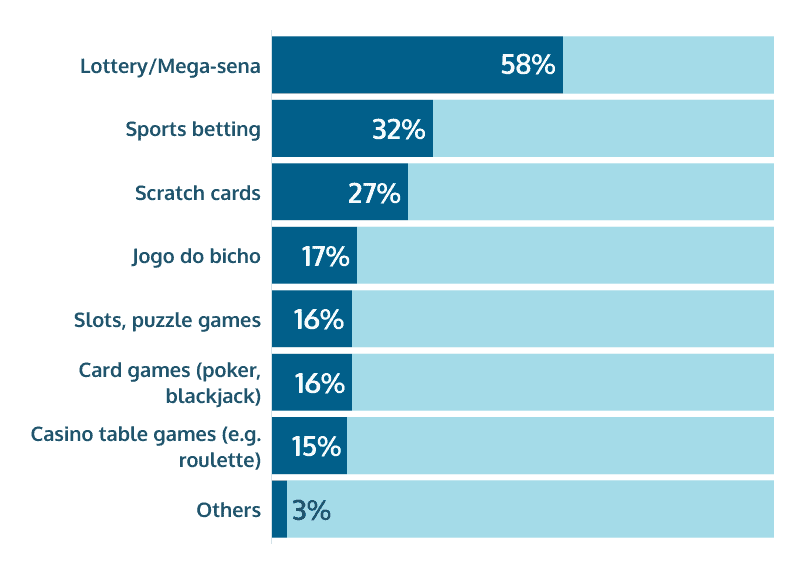
Engagement
According to players, though, lotteries are not the most engaging vertical, with sports betting being the most preferred category in this regard. Being inherently instant, “scratchies” occupy the fifth place, behind online casino games.
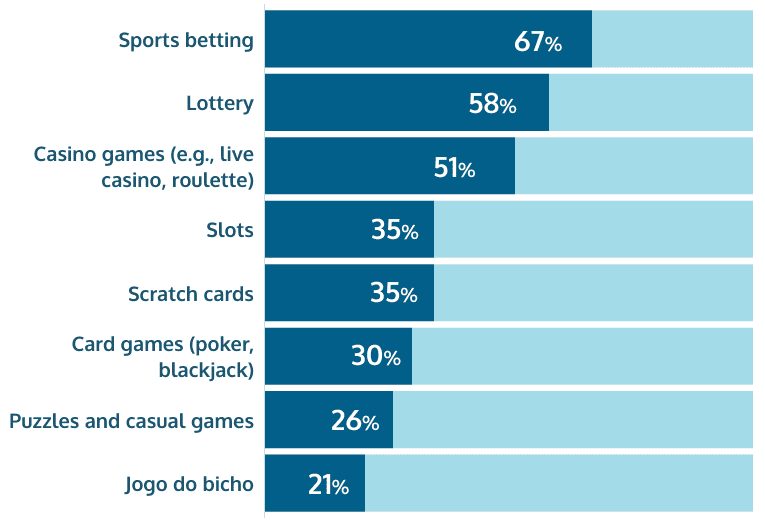
Mega-Sena, the most popular lottery in Brazil, is also the one which offers higher prizes. Despite the fact that players have their eyes set on high RTP lotteries, a considerable share of lottery fans prefers challenging odds compared to more favorable probabilities for winning lower prizes.
Recent Trends in the Lottery and Instant Game Market in Brazil
Since its regulation in 2023, the emerging Brazilian gambling market is inspiring new legislative and business initiatives. Lotteries, scratch cards and bingo are at the center of ongoing regulatory changes impacting the Brazilian gambling industry.
Caixa Federal was allowed to resume the marketing of Lotex scratch cards in early 2024. In June of the same year, with the approval of Bill 2.234/2022 by the Justice and Citizenship Committee (CCJ) of the Federal Senate, land-based casinos, bingo halls and horse race betting is currently also under consideration and an upcoming vote.
By establishing a new regulatory framework for these “old-fashioned” gambling verticals, the proposed law sets the stage for licensing, operation, as well as control mechanisms to combat money laundering and protect consumers in physical gambling venues.
According to the Senate Press Agency, the investments resulting from the approval of the project could reach R$ 100 billion and generate about 1.5 million direct and indirect jobs, while the potential annual revenue would be R$ 22 billion, distributed among the states, municipalities and the federal government.
New Regulatory Impacts on Federal Lottery Operations
Caixa Econômica Federal, the state-owned monopoly operator of the country’s most traditional and popular lottery games – is now facing new challenges along with new opportunities. In addition to entering the betting market, Caixa Econômica has formally announced the comeback of Lotex scratch cards, the instant games known as “raspadinhas” (scratchies) in Brazil.
Lotex – Caixa Econômica´s Instant Game
As mentioned earlier, Lotex (Exclusive Instant Lottery) scratch cards were marketed by Caixa until 2015, when the Comptroller General of the Union (CGU) ordered their suspension. Until then, between 70 and 80 million scratch cards were sold to the public each year, making Lotex a highly profitable asset.
While two consecutive federal administrations failed to privatize (sell) the Lotex brand, Caixa stayed out of the game for eight years, losing at least R$ 8 billion in revenue.
In October 2024, Lotex was allowed to resume operations once again in both physical and digital formats. The price of the scratch cards ranges from R$ 2.50 to R$ 20, while the prizes are expected to vary between R$ 2.50 and R$ 2 million, proportional to the cost of the card.
Caixa shared an initial annual revenue forecast of between R$ 1 billion and R$ 2 billion. With the return of scratch cards, Caixa also expects lottery sales to grow by at least 20%.
International Lottery Partnerships
In order to reactivate the scratch card operations, Caixa will partner with the LTX Brasil consortium – including the Chinese company Genlot Game Technology and BZP (Beinjing Zhongcai Printing), a joint venture between China Welfare Lottery, la Française des Jeux (the operator of the French and Republic of Ireland’s national lottery draws) and the Malaysian Berjaya.
The experience and reach of these private and public online lottery operators are expected to help Lotex boost digitization efforts and deliver user-friendly access across Brazil.
Improved Bingo Hall Rules in Sight
According to the above-cited bill, bingo operations would be allowed on a permanent basis in physical locations. Both card and electronic and video bingo would be allowed and, theoretically, every municipality could operate its own single bingo hall. Larger cities, though, could have one bingo hall for every 150,000 residents.
The license to operate bingo halls should be for 25 years, renewable for the same period. To apply for a license, gaming operators need to prove the ownership of a minimum paid-in capital of R$ 10 million.
Compliance and Taxation Model
Unlike the controversial Brazilian bingo halls of the past, new licensed gaming and betting operators would have to pay two new taxes – the Gaming and Betting Inspection Fee (Tafija) and the Contribution for Intervention in the Economic Domain levied on the commercialization of gaming and betting (Cide-Jogos).
Players would pay 20% income tax on winnings of R$ 10,000 or more. The calculation takes into account the difference between the winnings and the bets placed by the same player in the previous 24 hours.
Audited Bingo Machines and Rental Options
According to the same Agência Senado report, the bill also includes regulations on the rental of betting machines, requiring that all of them be registered and subject to periodic audits.
In addition, the operation of these machines must follow the ratio of 40% of the gross revenue for the rental company and 60% for the bingo or casino establishment, considering as gross revenue the difference between the total bets placed and the winnings paid out.
Online Bingo Games in Brazil
Regulated platforms already offer real time online bingo games and machines. Among the top ten online gambling brands operating in Brazil, the ones that offer either one or both modalities are listed in the table below:
| Brand | Live Online Bingo | Online Bingo Games |
|---|---|---|
| Betano | 3 games, only one in Brazilian Portuguese – Futebol Studio provided by Evolution. | 94 bingo games provided by Moby Games and Skywind Group, among others. |
| Betfair | 9 live bingo rooms in English. | 33 games provided by Red Tiger Gaming and Gaming Realms. |
| Bet365 | 14 live bingo rooms and three bingo communities for chat games. | 24 bingo games provided, among others, by Greentube and Neko Games. |
| Esportes da Sorte | 2 live bingo rooms provided by Evolution. | – |
| KTO | 11 live bingo games provided by Evolution and Pragmatic Play studios, among others. There are rooms for Brazilian Portuguese speakers, such as Mega Bola da Sorte and Mega Fire Blaze Lucky Ball Brasileiro. | 127 bingo games provided by Caleta Gaming and Darwin Gaming, among others. |
| Parimatch | – | 54 online bingo games provided by Spinmatic and Caleta Gaming. |
| Pixbet | 9 live rooms, including Mega Fire Blaze Lucky Ball Brasileiro, provided by Evolution Gaming. NSoft games are also present, among others. | 2 online bingo games provided by Games Global. |
| Sportingbet | 6 live bingo rooms named after Brazilian soccer stadiums. | 13 bingo games provided by Lucky Lady Games and Greentube. |
Regulation Calibrates the Social and Economic Impact of Lotteries in Brazil
Ultimately, lotteries, scratch cards and bingo games, while not considered as engaging as other genres, have a strong and sustainable appeal among Brazilians.
Legalized, regulated and audited, physical and online draws and instant games generate consistent revenue that should be channeled to essential public services, as lotteries have traditionally done for decades.
It is often simply the case of enforcing a coherent regulatory framework. Recent attempts and global good practices help correct mistakes of the past and pave the way to a sustainable lottery market in Brazil that is beneficial for the public at large.

